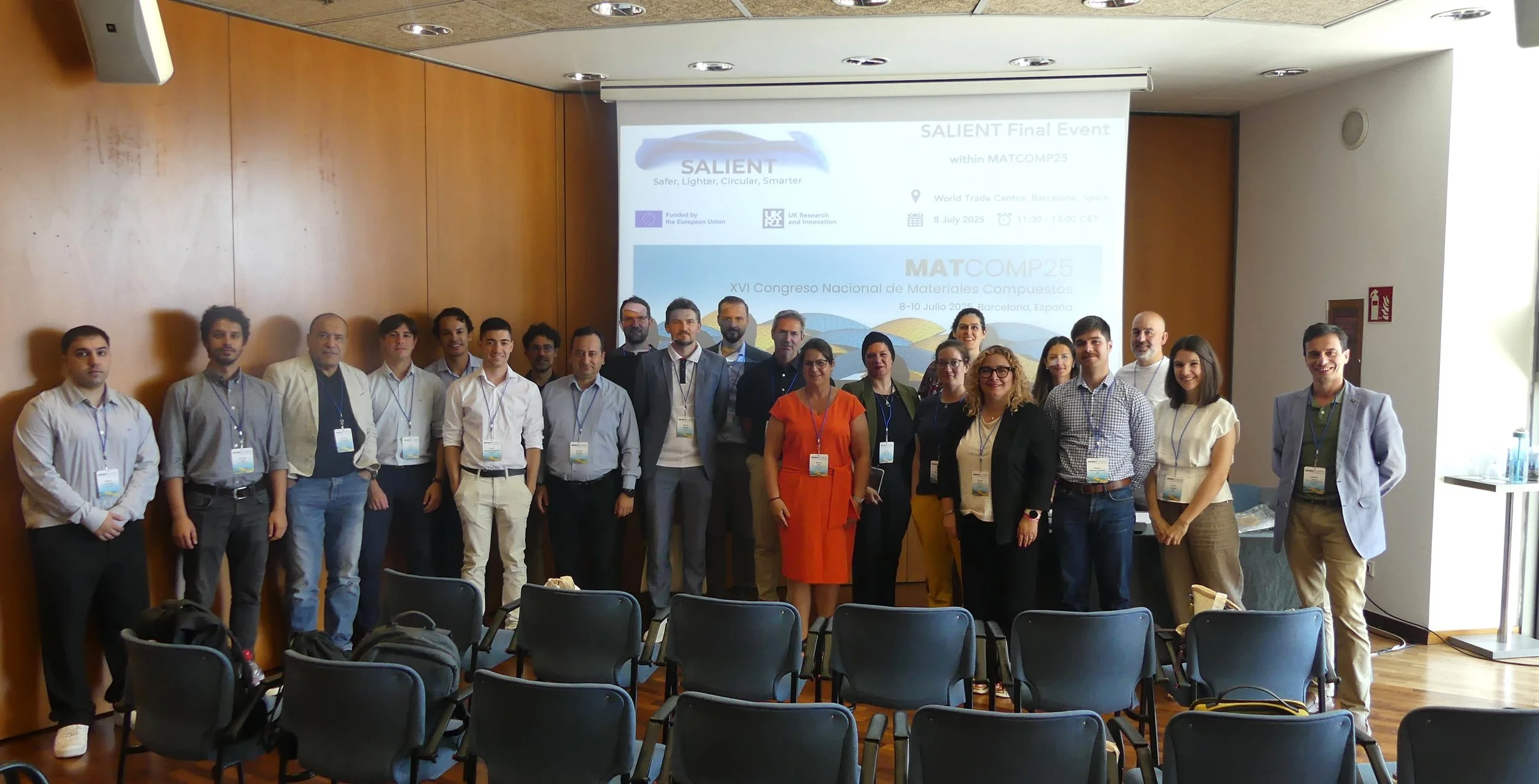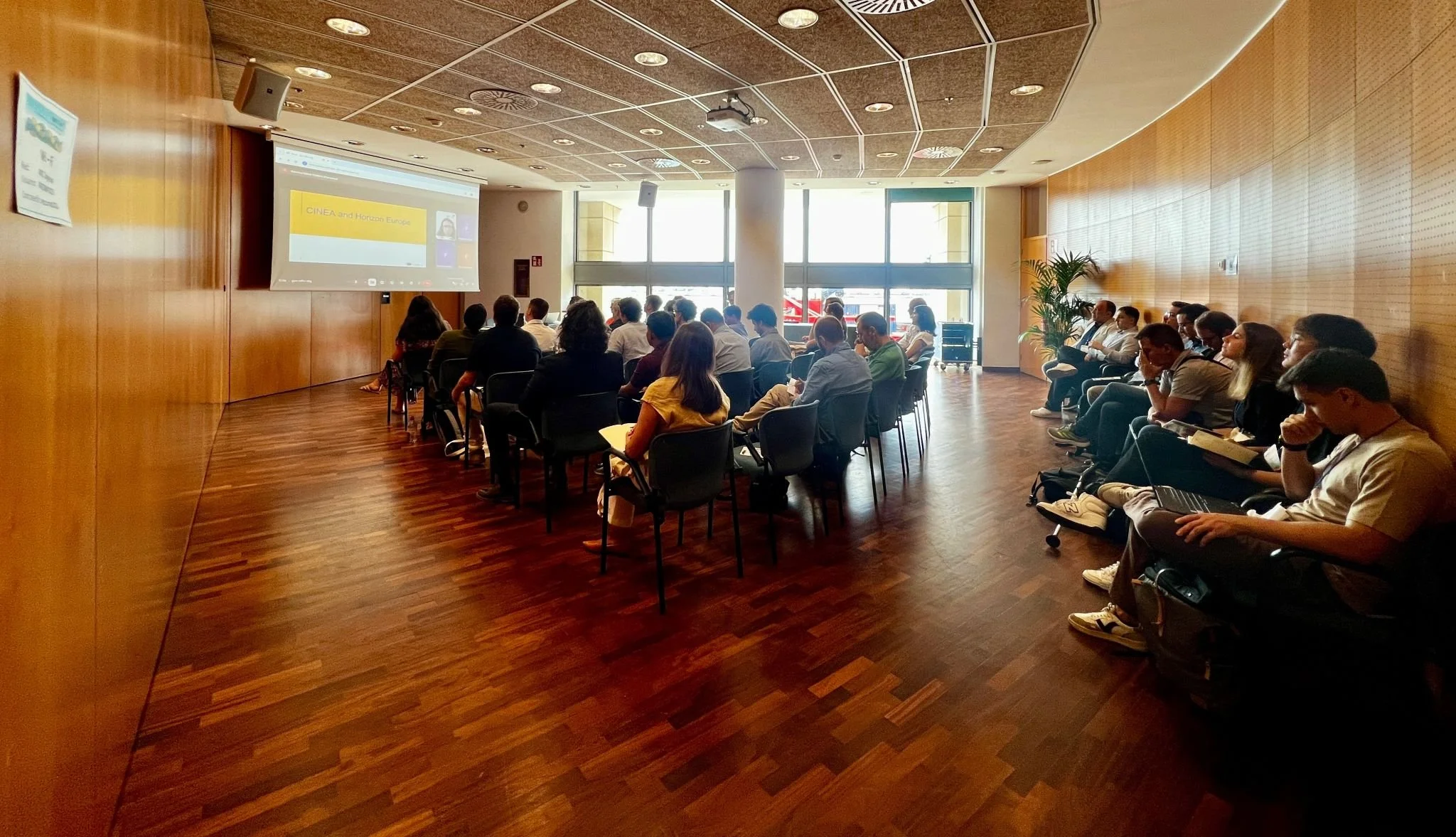SALIENT Final Event Showcases Key Achievements in Circular and Lightweight Automotive Design
SALIENT Project partners at the SALIENT Final Event on 8 July 2025.
On 8 July 2025, the Final Event of the SALIENT project was held at the World Trade Centre in Barcelona, Spain, where three years of innovation and research on lightweight and circular materials, marking a step forward for a safer and greener automotive sector in Europe, were presented.
SALIENT is a Horizon Europe initiative that started in September 2023, bringing together 12 partners from across 7 European countries who joined forces with one focus: to bring a new generation of automotive Front-End-Structures to life.
On 8 July 2025, the Final Event of SALIENT was held in collaboration with the MATCOMP25 conference, one of Spain’s largest national conferences on advanced composites.
Participants at the SALIENT Final Event on 8 July 2025.
As the project officially ends in August 2025, project partners showcased the milestones achieved, key results, and lessons learned to over 45 participants during the Final Event, held as a parallel session of the MATCOMP25 conference on 8 July 2025, from 11:30 to 13:00 CET.
SALIENT was in the spotlight of the MATCOMP25 with a stand presentation, demonstrating the frontal part of the Front-End-Structure prototype. The project results captured the attention of the audience, sparking a discussion on the innovative lightweight and circular concepts that were followed.
SALIENT Stand at the MATCOMP25
During the Final Event, project partners reflected on the technical progress in the design of materials and components capable of better accommodating crash scenarios and collisions.
Raquel Ledo, Head of the Product Innovation and Materials Department, Product and Materials at CTAG, the project coordinator of SALIENT, kicked off the Final Event with welcome remarks and an overview of the project’s main objectives. Following, Katerina Deliali, Project Officer at CINEA, highlighted the importance of EU-funded initiatives enhancing circularity in the automotive sector. Ahmed Elmarakbi, Professor at UNN, the scientific coordinator of SALIENT, presented how new structural and vehicle concepts have been developed within SALIENT, with integrated eco-design principles. Also, he highlighted how the joint effort across various disciplines, including an Advanced Driver Assistance System (ADAS), design, manufacturing, simulation, testing, Life Cycle Assessment (LCA) and Life Cycle Cost Analysis (LCC) has laid a strong basis for future research in lightweight and adaptive crashworthiness structures for mixed traffic scenarios.
Following this, Patryk Nossol, Scientist at Fraunhofer IWU, and Sebastian Iwan, Managing Director at ThermoPre, showcased the development of the SALIENT advanced crash box, achieving a fourfold improvement in energy absorption (105 kJ/kg vs. 28 kJ/kg for aluminium), while also supporting recyclability and industrial scalability. Karlheinz Kunter, Lead Researcher at Virtual Vehicle, explained how, within SALIENT, full-vehicle crash and compatibility validation in modular simulation environments demonstrated that activating adaptive crash components (AC1) can increase energy absorption by up to 10.1%.
Finally, Jorge Velasco Manrique, Project Engineer at CIDAUT, and Victor García Santamaría, R&D Project Engineer at Applus+ IDIADA, explained the crash testing and validation of SALIENT’s CFRP crash boxes. Physical tests using a 1493 kg trolley confirmed that the Adaptive Composite Front-End Structure (ACFES) behaved as intended, demonstrating that the adaptive features enhanced safety and effectiveness under real-life conditions.
On the next day, SALIENT partners united once more at Applus+ IDIADA Headquarters for the final in-person consortium meeting, in order to review the last quarter’s activities ahead of the official project closure.
SALIENT Partners at Applus+IDIADA Headquarters.
The SALIENT consortium is proud to have contributed to integrating circularity principles into vehicle design for the automotive sector, in alignment with the European Commission's vision of achieving climate neutrality by 2050, decarbonising the sector, and increasing road safety in Europe.
The proceedings and pictures are now available.




